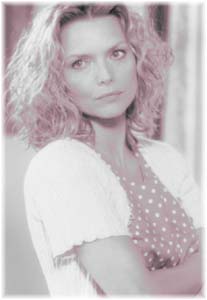

[ Movies Index | Metro | Metroactive Central | Archives ]
Smiley's People
Photo by Ron Batzdorff
'A Thousand Acres' is shrunk to fit onscreen
A few important deletions and a great deal of miscasting turn Jane Smiley' fine novel A Thousand Acres into our worst fears about a feminist movie--a story of the empowerment of vague, idle women, in which the men are either weaklings or monsters. Again, Smiley's book is not that way; betrayal is as likely to come from the female side of the family as from the male. The story is a feminist retelling of King Lear, set in Iowa in the 1980s. Lear (Larry, played by Jason Robards) divides his land as a donation to his three daughters. Regan, the rebel daughter (called Rose and played by an out-of-her-depth Michelle Pfeiffer), leads the obedient Goneril (Ginny, played by Jessica Lange) against her own father. In his loss, Lear is sheltered by loyal Cordelia (Catherine, played by Jennifer Jason Leigh).
Director Jocelyn Moorhouse, late of How to Make an American Quilt, approaches the material wrong foot forward, making the story a pretty pastoral. Here are some beautiful vistas by cinematographer Tak Fujimoto; here's some fake Satie-style "morning in America" music by Richard Hartley; and here are, as Hamlet said, words, words, words. Lange's narration unnecessarily reinforces the images and incidents. (After one scene, she tells us, "We all understood that something important had just happened." In other words, you didn't see it onscreen.)
Jason Robards is miscast, though he has his moments. In a half-senile daze, he murmurs words of seduction to Caroline, his "little birdy girl." When he denounces his daughters, he shouts his lines in a Shakespearean roar. To reverse that famous gag from Monty Python and the Holy Grail, Larry the king is the only one who has shit on him. He's the only one who actually seems to farm. Smiley is matter-of-fact about the muckiness of farm life: castrating piglets, spreading dangerous chemicals and eternal scrubbing. From this movie, however, it's hard to determine what exactly the women do--a little cooking mostly. The farm seems to run itself while Rose and Ginny stew in their juices. Lange has the toughest part, and she fumbles through it. Ginny chews on her lips to show confusion and inarticulation; her final rebellion looks like a fit. She explains that she's changed ("I was a ninny"), but we don't see her evolution--just that her tics are quieted at last.
One reason the novel made its mark is that it explained that even hard-working farmers could be ruthless people. Unshakable conservatism, gossip, greed and pollution are as much a part of rural life as windmills and sunsets. Moorhouse and scriptwriter Laura Jones (who adapted Henry James' The Portrait of a Lady) are faithful to most of Smiley's incidents. Yet neither captures the last thing Ginny tells us: that the obsidian sharpness of her anger has finally lead her to understand even the inhumanity of her father. Instead, we get phony redemption and bonding. A Thousand Acres is a therapeutic movie; like a dead horse, the novel has been rendered into soap.
[ Metro | Metroactive Central | Archives ]
Copyright © Metro Publishing Inc. Maintained by Boulevards New Media.

The Farmer's Daughter: Michelle Pfeiffer plays one of Jason Robards' unruly offspring in Jocelyn Moorhouse's 'A Thousand Acres.'.
A Thousand Acres (R; 104 min.), directed by Jocelyn Moorhouse, written by Laura Jones, based on the novel by Jane Smiley, photographed by Tak Fujimoto and starring Michelle Pfeiffer, Jessica Lange, Jason Robards and Jennifer Jason Leigh.
Web exclusive to the Sept. 18-24, 1997 issue of Metro.